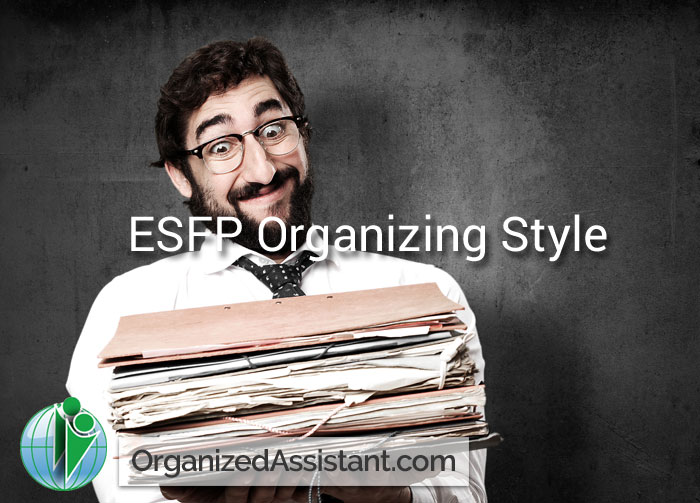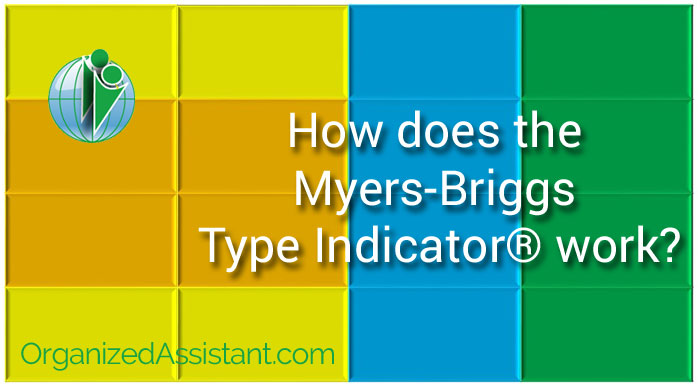ESFP Organizing Profile
This page may contain links to Amazon.com or other sites from which I may receive commission on purchases you make after clicking on such links. Read my full Disclosure Policy

Today I’m presenting the 16th and last of my personality type based organizing profiles. Some of you may be relieved, but if you’ve been lapping these up, you’ll be glad to know that I have a few more resources to share with you before wrapping up the series.
This post looks at ESFP, which stands for Extraverted – Sensing – Feeling – Perceiving. If you’re just jumping in today, you’ll probably want to first read Organizing for Personality Types.
ESFP Organizing Strengths
ESFPs consider themselves to be naturally organized, although they may not always appear that way to others, particularly those with a Judging preference. One ESFP shared the following:
“I’m the most organized person I know, at home or at work. I’m a piler of course, not a filer. Although, I’m trying to put more things on files by setting up new files on subjects that make sense to me and using them as extra piles. Whatever I start I finish and I am probably the most adept user of Outlook in my entire workplace.”
Another said,
“It’s not clutter to me. I know what’s in every pile.”
They typically finish what they start and have an effective calendar system.
ESFP Organizing Challenges
ESFPs indicate that they experience the following:
- Forgetting about social activities, meetings and appointments, or tasks that aren’t on their “to do” list
- Prioritizing tasks and activities
- Procrastination
- Hoarding and clutter issues, particularly with unread magazines and newspapers and items with sentimental value.
That’s not to say that they view these issues as problems. Someone said,
“If it has sentimental value, I keep it. No problem.”
ESFPs are strongly people-oriented, and their strong desire to help others can lead to overextending themselves, if it is not controlled. One ESFP explained:
“As I’m 51 years old, I’ve learned to say no when necessary. But saying yes gives you more opportunities; it just might take a bit longer to get some things done.”
They may be easily distracted, stopping work when someone wishes to talk to them.
ESFP Time Management Systems
ESFPs use a variety of systems to keep track of their work, including both formal planning systems and computer calendars. Here’s what an ESFP said about their system:
“I live and die by my Outlook calendar. If it’s not on it, I don’t remember it. Everyone knows to email me with anything they want me to know or do.
It’s not hard for me to prioritize tasks and activities. Every project and task has a priority level set on it straight away.
At work, if it’s not on Outlook, it’s not important. At home, I have no lists. Fly by the seat of my pants and don’t worry about it. I keep life as simple as possible.”
Some keep a simple to-do list; others rely on a mental list or reminders from their team members.
Learn More
For more insight into the ESFP organizing style, read about Fun Freedoms on Pixies Did It.
For a broader view of the ESFP personality type, check out the following resources:
Keep in mind that we are all unique, and even people sharing the same type preferences will not be the same in every way. Personality type is only one factor to consider when developing organizing solutions for your clients.
Are you an ESFP?
Help others understand your personality type and organizing style by answering one or more of the following questions in the Comments:
- What are your organizing strengths?
- What are your organizing challenges or weaknesses?
- What organizing strategies work well for you?
- What are your time management strengths?
- What are your time management challenges or weaknesses?
- What time management strategies work well for you?
- What type of calendar(s) do you use?
Photo © kues / depositphotos




Thank you for sharing this series. With all the different personalities, it was difficult to figure out which one I was. Though, I guess that’s to be expected since they overlap a bit. I did see my organizing profile in several of them. It is definitely worth looking at these profiles to figure out how one is to determine the method one should take to organize.
Sabrina, these profiles aren’t intended to help you identify your personality type, but to shed light on the organizing style for each particular type. The best way to discover your type is by completing the MBTI with a trained practitioner, but you can get a rough idea by doing the Jung Typology Test on the Humanmetrics website.
Thank you Janet for all the wonderful information. I had a bit of a chuckle when I read “It is not clutter to me, I know what is in every pile”. Often people think they do, but in actuality they don’t.
It amazes me when they actually do! They have to keep in mind though, that there could be an occasion where someone else needs to find something – when I worked in an office, I hated having to look for a file when the person who had it was off sick!
Great series, Janet! I think what most stood out in this particular profile was the statement about the many piles, but knowing where things are. It’s an important point because clutter or stuff being out and visible doesn’t mean that someone isn’t organized. Organized looks and feels differently to each of us. As long as we’re functioning optimally in our environment, whatever it looks like, that’s what matters. Thank you for highlighting that point.
And as long as it works for anyone else who needs to access those items!
I used to suggest that clients who were pilers use a literature sorter, so they could continue to have their piles, but move them out of their work area and even label the piles for the benefit of any co-workers who may need to find something. I actually find this tool works for all types of people!